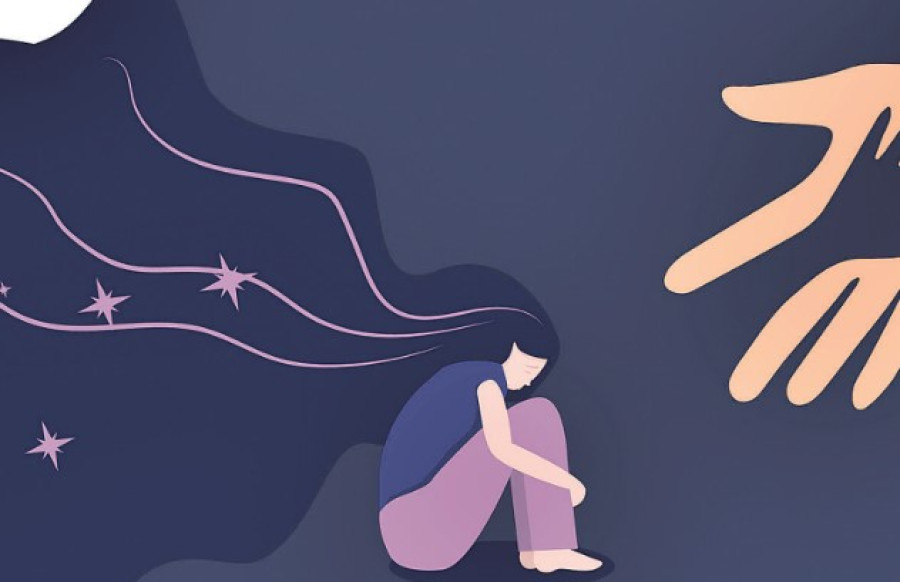National
Poor understanding of consent fuelling adolescent dating violence
Inclusion of consent as a significant aspect of sex education would be a step forward, experts say.
Manushree Mahat
A year into her relationship, Aditi felt coerced into having sex with her boyfriend. The incident happened around three years ago when she was 16. Aditi recalls feeling uncomfortable throughout the whole act. She did voice out her discomfort before it began but her boyfriend ignored her, reasoning that since they were in a relationship, they should have sex.
“I told him several times that I didn’t want to have sex but he would ignore my concerns,” says Aditi, who spoke to the Post on condition of anonymity. Throughout their relationship, “consent was not a part of his vocabulary,” says Aditi. It went so far that he isolated her to the point that she never had any close friends to talk to about any of it. She kept it all to herself and had to pretend as if what she was going through was normal. “If I had someone to talk to, to tell me that I had every right to feel haunted by what he did, I wouldn’t have to feel isolated for so long,” Aditi says.
Adolescent dating violence (ADV)—which is defined as any intentional, psychological/emotional, physical or sexual abuse that occurs between people involved in a romantic relationship—is a lot more common than we think, studies and experts say.
According to the National Demographic Health Survey 2022, 27 percent women in Nepal have experienced Intimate Partner Violence (IPV) in their lifetime. Meanwhile, a total of 985 complaints were registered with Nepal Police for rape and sexual assault where the victims were under the age of 18 in the last fiscal year.
Victims who face violence in relationships often go through a slew of mental and physical problems afterwards, says Sharada Puri, programme coordinator at Chhori Organisation, which works for victims of trafficking and sexual assault. To make matters worse, the victims are often silenced and neglected by their families, adds Puri, who is also a psychologist.
“I’ve listened to girls who’ve felt coerced to do what their partner pleases in relationships,” Puri says. “Girls are often forced into believing they have to listen to their partner’s sexual demands.”
Sexual violence from intimate partner at such a young age has severe consequences on mental health. A 2019 study found that consequences of ADV include depressive symptoms, low self-esteem, psychiatric disorders, drug abuse, and risky sexual behaviour, among others.
Aditi, who suffered depressive symptoms for some time, wonders when she’ll be able to have a normal relationship. Every guy she meets, she measures on the traumatic experiences she had with her now ex-boyfriend.
“Even when I talk to a guy I like, I wonder if he’ll treat me the same way,” she says. “I can’t stop myself from thinking about it.”
Gender experts and victims say that there is a general lack of understanding of consent among teenage boys.
Sangita Budhathoki, a gender specialist who has experience working in adolescent health and gender-based violence (GBV), says that lack of an understanding of consent among men can be mainly attributed to the limits of our education system. Instead of getting awkward and sweaty in front of the young masses when teaching sex education, teachers should open up to details that will enable the students to truly understand the topic at hand, she says.
“If the students are curious about a sex-related topic, it is essential for teachers to create a safe environment at schools to teach them about the right and wrong sexual behaviour,” Budhathoki says. “There needs to be more openness to talk about responsibilities regarding sex, and what consensual sex really is.”
Inclusion of consent as a broader and significant aspect of sex education would be a step forward, Budhathoki adds.
A 2023 study conducted in a settlement in Nairobi analyses the huge gaps in communication and societal expectations that forms a misunderstanding of consent and sexual violence in adolescents. The cultural and societal perception of men as ‘dominant’ and women as ‘subservient’ often collides with the misbelief that a lack of consent from women is normal and expected. It also forms the basis of ‘token resistance’, where men believe that a ‘no’ actually means ‘yes’.
Puri, who has worked with girls, provides a similar perspective on consent perception in society. “This applies to all kinds of sexual assaults as well,” Puri says. “This need to feel dominant drives boys and men to believe they can do as they please.”
The same study assessed the understanding of consent on the boys’ part. Ignoring an initial ‘no’, and token resistance were perceived by many boys as normal. In shocking results though, many women also believed that a ‘no’ could mean ‘yes’, because the said girl or woman is shy and passive.
Unwarranted sexual advances have been normalised not just among boys but also girls in Nepal, as 19-year-old Rehana, who went through a similar experience as Aditi, attests. Something that happened following the experience still haunts her, Rehana recalls. People, mainly her girl friends, would come up to her to tell her that this kind of behaviour from boys was ‘normal’, and that she should just forgive him and move on.
“Having to experience something that traumatic, and then having people I called my friends tell me it was normal destroyed me,” says Rehana, who the Post is identifying with a pseudonym to protect her privacy.
Aditi also says that sometimes even girls can be entirely unaware or ignorant of the severity of sexual violence.
“We are so used to nonconsensual sexual advances from our partners,” says Aditi. “I know that for the longest time I convinced myself that what was happening to me was okay.”
It all comes down to teaching adolescents the difference between right and wrong sexual behaviour, says Budhathoki.
“Adolescence is a vulnerable age, filled with urges and desires, which for the most part are normal,” she says. “But teaching how to handle those urges without hurting anybody is without a doubt the most important part.”
Incorporating consent education in schools can involve something like the Relationships and Sex Education (RSE) curriculum that England practices as mandatory in its schools. Beginning from primary schools, the curriculum teaches children the meaning of healthy relationships and boundaries, and why consent is crucial to any sexual act.
Integrating consent is crucial to maintaining safe sexual behaviour in the long run, Budhathoki says.
As a result, a greater awareness about consent would cut down on incidents of ADV, while also generating a better support system for victims like Aditi.
“I’m a lot happier and freer than I’ve ever been in my life now that I’ve broken up with my boyfriend,” Aditi says. “But if I just had the right people to talk to, and the right people to tell him that he was wrong, I would’ve saved myself the trauma that I now carry.”




 8.88°C Kathmandu
8.88°C Kathmandu















